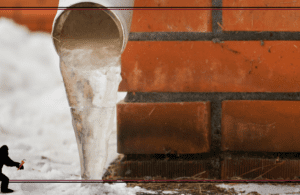It is just about freezing here in Lynwood, Washington. Literally… our temperatures are dropping into the 30’s at night! And, we here at Steve’s Plumbing wanted to make sure you know how cold weather affects your plumbing, so your pipes run smoothly throughout the holidays and into the new year.
Here is an outline of which pipes to keep an extra eye on during the winter months. Listed are the plumbing pipes (starting with the pipes most likely to freeze) that are in jeopardy of freezing-up this winter.
Pipes That Freeze Frequently
-
Outdoor Water Lines
-
Basement Pipes
-
Attic Plumbing
-
Pipes In Your Garage
-
Kitchen Cabinet Piping
-
Exterior Wall Pipes
What do all of these pipes have in common? They all lack insulation. And, when a pipe gets cold enough, the water within that pipe will freeze and wreak havoc on your plumbing.
Frozen pipes can cause a myriad of plumbing fiascos.
Signs You Have A Frozen Pipe
If you experience any of the following plumbing symptoms, contact a professional plumber for pipe repair.
-
Your water pressure drops.
If your shampoo is no longer washed away in minutes, your water pressure is inadequate. Low water pressure is a sign that you may have a frozen pipe. A lack of pressure directly correlates to the development of a leak in your plumbing.
When water freezes, it expands in your pipes, causing pressure to build-up until your water line can no longer take it. Broken pipes will need to be repaired in order to restore substantial water pressure.
-
You notice water spots, or pooling water, throughout your home.
If you see water spots on your floors, your walls, or your ceiling, you have a leak. Contact a professional plumber to repair your broken pipe and conduct leak repair before irreparable damage ensues.
-
There is a musty stench in your home.
When water freezes in your pipes, it inhibits water from flowing properly. This can cause backflow, which is the unwanted reversal of water flow within your plumbing. Not only will backflow contaminate your potable water supply, but it will also emit a foul odor. Additionally, your plumbing is no longer airtight; hence, the putrid smell that will waft throughout your home.
-
Your foundation looks cracked.
If you notice foundational damage, you may have a ruptured pipe. When a pipe freezes, the water within that pipe does not stay completely frozen for the entire winter. That scenario is actually extremely unlikely.
Instead, the water within your pipes fluctuates from ice to water, and from water to ice, as temperatures outside vary. The expansion that occurs when your water freezes can cause cracks that, when the ice thaws, water will leak out of. Leaking water then drips into the structure of your home, threatening its integrity.
-
Your water bill increases out of nowhere.
If your monthly water bill is uncharacteristically high and doesn’t match your usage, a pipe is likely leaking! This can occur from a crack, but it can also result from loose plumbing connections. Connections can separate when the water within your pipe freezes and expands. The pressure that accumulates within the pipe, pushes your plumbing connections apart.
A frozen water line will increase your utility costs, as your plumbing is struggling to properly function.
Prevent Frozen Pipes
-
Disconnect all outdoor water sources, such as hose bibs and water features.
-
Insulate your attic, garage, and basement.
-
Keep your garage door shut when you can.
-
Maintain an even indoor temperature above 55 degrees Fahrenheit.
-
Seal any air leaks around your window and doors.
-
Place electrical heat tape and insulation around your easily affected pipes.
For all of your pipe repairs this winter, contact Steve’s Plumbing, LLC at (425) 979-7376. We will make sure your pipes are ready to take on the chill. 
